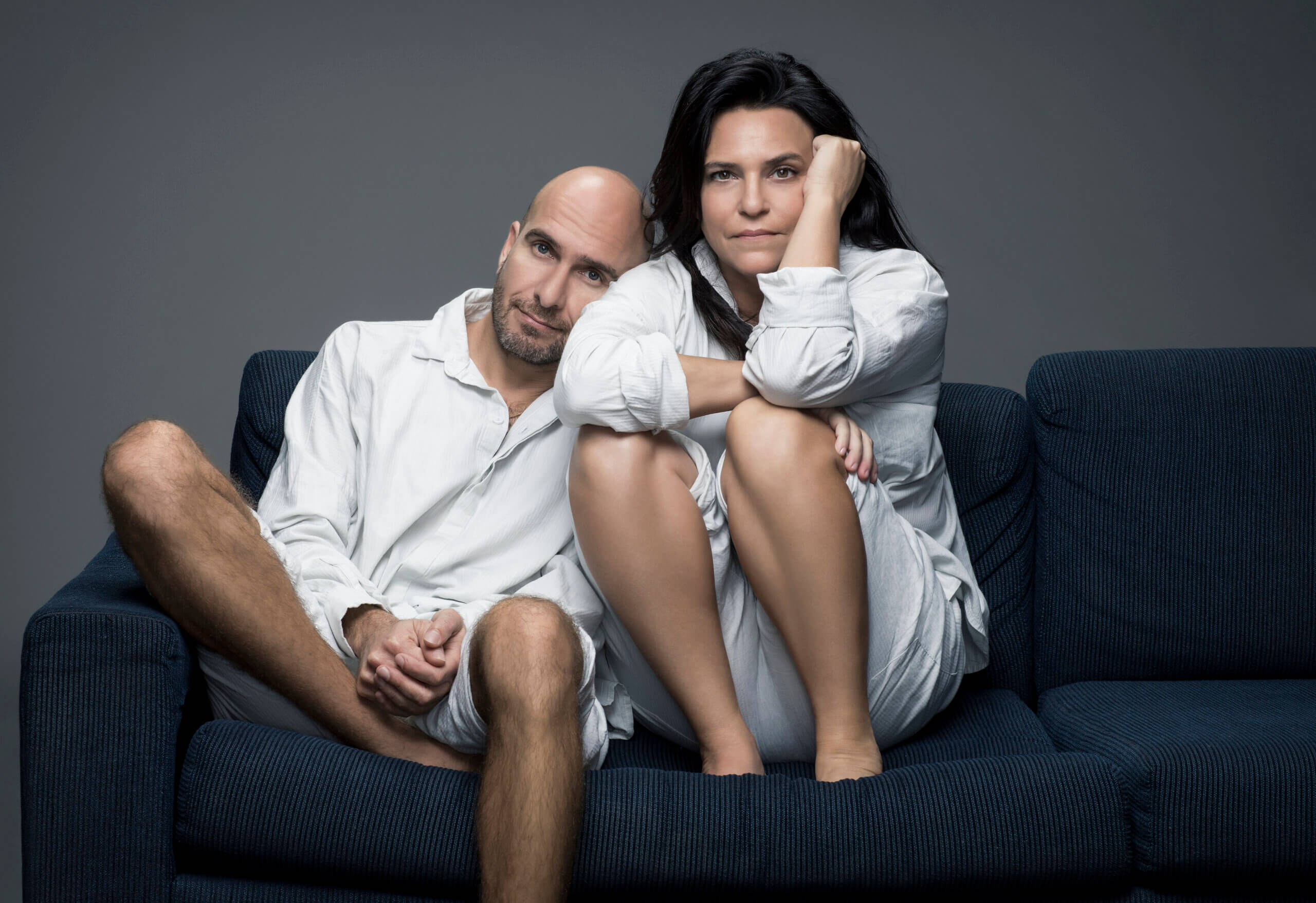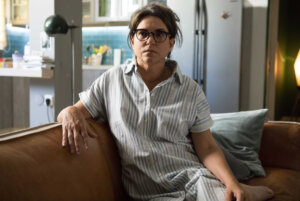Israel’s ‘best comedy’ arrives in America — with honesty, nihilism and subtitles
In ‘Significant Other,’ two neighbors find a balm for loneliness in each other

Graphic by Angelie Zaslavsky
Set at the intersection of free will and fluke, “Significant Other,” an idiosyncratic and nuanced Israeli TV series, centers on the evolving — or perhaps, more precisely, the non-evolving — romantic relationship between two neighbors.
The unnamed, 50-something neighbors, played by Assi Cohen and Dana Modan, have little in common short of a comic and sometimes dark existential emptiness. They live in a universe where relationships fall short at best and for the most part fail dismally. Yet they still seek that elusive connection.
Make no mistake, though: “Significant Other” is laugh-out-loud funny at its most unsettling moments. And the chemistry between the two leads is palpable.
The series opens in a bleak apartment, where Cohen scarfs down dozens of pills, then stretches out on his bed waiting to die. His efforts are interrupted when Modan bangs at his door, proclaiming she is suffering a heart attack. After the ambulance arrives, both are carted off to the hospital where his stomach is pumped and her condition is stabilized. They are poked, probed and analyzed by deadpan, compassionless doctors who suggest an improbable amalgam of Borscht Belt and theater of the absurd.

During their hospital stay, Cohen does most of the talking, while Modan listens and silently assesses. He’s a type we’ve met elsewhere: the self-pitying and enraged ousted husband splitting from his entitled wife Shelley, an expensively dressed real estate broker who is bringing up their two children with her new boyfriend even though Cohen is bankrolling just about everything.
Our lonely protagonists return to their apartments and their lives largely continue as before, though they intermittently have sex with each other. His passion is more intense than hers, but in the post-coital moments he’s already on to something else. After one sexual encounter, he gets up to clean his air conditioner filter. While the duo forms the narrative centerpiece, larger themes, dealing with a host of intimate relationships — husbands and wives, parents and children — emerge.
Now in its second season in Israel, the show has won a number of awards, including best comedy series at the Israeli Academy TV Awards. Modan, often compared to Elaine May, is a double threat . She co-conceived and wrote every “Significant Other” episode, which serves as a follow-up of sorts to “Love Hurts,” a comparatively innocent and cheerful 2005 miniseries that she penned and co-starred in alongside Cohen. In that show, lovers from opposite sides of the tracks find happiness. “Significant Other” views love through a more fatalistic, even nihilistic lens as it grapples with aging and death.

Modan’s character is the more ambiguous of the two. She doesn’t seem to have a job and she has never had any great desire to get married or have children, though she’s had a series of go-nowhere relationships with married men who disappear and then reappear years later at which time she may (or may not) engage in a one- or two-night stand with them. No hard feelings either way.
As an ungroomed, allegedly overweight woman of uncertain age, she is subtly and sometimes not-so-subtly demeaned by everyone, including women, who feel free to question her about her marital status and the fact that she has never had children.
“You’re single. Widowed? Divorced?” one female acquaintance asks her, stunned. When Modan shakes her head no, her inquisitor says, “Oh, so you’ve had nothing.”
Modan seems to like Cohen; perhaps she’d like him even more if he cared for her. At one point, she overhears him telling his daughter that she doesn’t have to worry about him remarrying since Modan’s nothing more than a neighbor with whom he does “adult things.” Even so, Modan continues her relationship with him.
It’s not easy to parse where Modan is coming from, and that’s part of the show’s fascination. Is she a post-liberated woman or is she a throwback victim who is kidding herself? Is she freely choosing this relationship or does she have no real choice if she wants companionship? Is she innately as apathetic as he is or has she concluded, consciously or unconsciously, that the only way to survive is numbness?

In one striking scene, Modan and Cohen visit a couple they’ve never met in order to engage in group sex. We never learn what brought them to this moment or how they even found the swingers. Yet in this creepy interlude the two men and two women respectively form the most genuine friendships in the show. The anonymity allows for emotional intimacy.
One of the show’s greatest assets is the way it delicately handles death, which remains an encroaching spectral presence throughout. We see Modan consulting a plastic surgeon because of a few lines on her face and attending her grandmother’s funeral.
Still, I have some quibbles. Most of the supporting characters are too familiar. I am also troubled by Modan’s shadowy work life. And about the name-free heroes — though the lack of specificity may be intended to convey universality, mostly it’s just puzzling.
Those points aside, “Significant Other” is an original multilayered series. In a particularly trenchant episode, Cohen and Modan find themselves in a neighbor’s apartment where a bunch of partying know-it-all 20-somethings view them with patronizing curiosity. Spied kissing and hugging in a rare moment of reconciliation, love triumphs just as our maturing heroes have morphed into adorable fossils.
“Significant Other” will stream on ChaiFlicks beginning Thursday, Nov. 10















